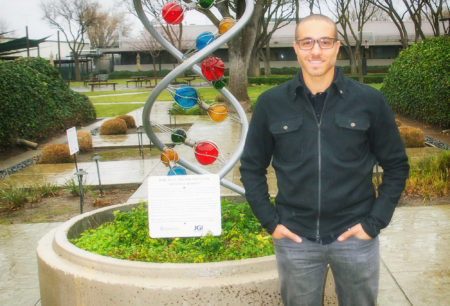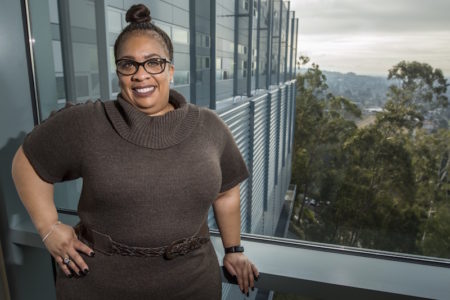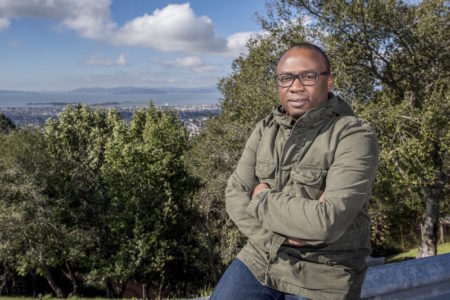What started as Negro History Week in 1925 was expanded to a month in 1976, the nation’s bicentennial. President Gerald R. Ford urged Americans to “seize the opportunity to honor the too-often neglected accomplishments of black Americans in every area of endeavor throughout our history.” To mark Black History Month, also known as African American History Month, we feature stories on three Berkeley Lab employees—Steve Wilson, LaTonja Wright, and Edson Okwelum.
Steven Wilson, Shared Components Team Lead, Joint Genome Institute

(Credit: DOE Joint Genome Institute)
Lately, Steven Wilson has been talking to his 101-year-old grandfather a lot. He’s been hearing more about the life decisions his ancestors made and feeling extremely grateful as he realizes how their actions have affected his own life. Wilson says it was his great-grandfather’s move from rural Louisiana to Chicago to become a unionized steelworker that really set in motion a series of successes that defined the future of the family.
“It was a landmark moment in my family’s history, and I am incredibly grateful that he made that decision,” says Wilson, Shared Components Team Lead at Joint Genome Institute (JGI). “He took a chance, leaving his extended family and his job as a short order cook in search of something better.”
Because of this decision, Wilson’s paternal grandfather grew up in Chicago with the security and comforts that his father’s unionized job provided. He ended up becoming a quality control engineer for a large engineering company. “As a dark-skinned African-American man in the 1950s and 60s, my grandfather having such a position of authority at a large company like that was really amazing,” Wilson says.
And his paternal grandmother was a teacher and principal in the Chicago school system. “Because of their successes, my own father grew up with the world view that even though there might be struggles, he was capable of achieving anything he wanted,” Wilson says.
Wilson’s father got his MBA from the University of Chicago and worked for Bank of America for a long time. “The quality of life he and my mom were able to provide for me and my brother really shaped my experience and my success,” he says.
Wilson first became interested in biology in seventh grade and genomics in high school, and his passion was deepened when he did a summer internship with a UCLA medical school professor at the VA Medical Center. “They were doing a lot of DNA sequencing and I got to help with that,” he says. “I was so fascinated by it and was totally hooked.”
Wilson’s mom was very involved in her sons’ education and took an active role in helping them think about college and plan educational summer programs. It was during a college tour for his older brother that Wilson discovered a bioengineering program. His interest in the program stuck, and he went on to pursue a degree in bioengineering at UC Berkeley.
Throughout college, Wilson worked at a biotech firm in South San Francisco, using a genome sequencing machine that was considered cutting-edge at the time. After college he started his career at JGI as an instrumentation engineer, doing a lot of hands-on work with the robots and writing programs.
Over the years his role at JGI has shifted, and he’s taken on more project management duties. He’s now team lead for the Shared Components team, which is responsible for data warehousing (aggregating data from multiple systems at JGI) and software quality assurance (testing software for multiple systems at JGI). Last year Wilson represented the Lab as a “Berkeley Lab Ambassador” at the National Society of Black Engineers’ (NSBE) annual convention.
Wilson has seen the mechanics and technology involved with genome sequencing advance rapidly in the years he’s been involved in the field. “I don’t feel that old, but I’ve seen DNA technology change so much in 25 years,” he says. “It’s pretty amazing.”
The pace of change in his field of work makes him also contemplate the history of change in African-American rights in America. “The current political environment has taught me to have a new perspective on just how short history is; temporally, how little time there actually has been in between some landmark events in our nation’s history,” Wilson says. “I was born in 1979, only 11 years after Martin Luther King was assassinated and just 14 years after the Voting Rights Act was passed. As I get older, that amount of time seems smaller and smaller.”
LaTonja Wright, HR Division Partner, Computing Sciences & IT
LaTonja Wright knew she wanted to work at Berkeley Lab after taking part in a student internship program sponsored by the Department of Energy in the early 1990s. Almost 25 years later, she has finally found her place at the Lab as an HR professional for the Computing Sciences and IT Divisions. But on top of her HR duties, Wright soon found herself called upon to help launch the Lab’s first African-American Employee Resource Group (AAERG). It’s a role that she has embraced, seeing it as yet another step in fulfilling her goal of making a difference.
When she heard from a colleague in Workforce Development and Education, Colette Flood, about Berkeley Lab COO Glenn Kubiak’s idea to form an African-American resource group at the Lab, Wright knew that she’d found a place to apply her skills. After months of brainstorming, Wright and colleagues will launch the AAERG this month.
“Our initial purpose is really to inspire and empower African-American employees at Berkeley Lab by helping them to uncover career and personal growth opportunities,” says Wright. “I’m so happy to have this opportunity to infuse hope and desire in my African-American peers.”
Inspiring colleagues, family, and friends with career development advice and guidance has been Wright’s passion for as long as she can remember. Though she started out by training as a paralegal, she always aspired to work in human resources—beginning with World Savings Bank in Oakland in the 1990s, and most recently as an HR Specialist at AIG prior to joining Berkeley Lab. While at AIG, where she worked for more than seven years, she also sat on the company’s diversity council.
Wright had tried for various positions at the Lab over the years, and her chance finally came in 2015. Along the way, she completed her undergraduate degree, took exams to become certified as a Professional in Human Resources (PHR) through the Society for Human Resource Management, and is now working on completing a master’s degree in Human Resources Management.
Wright says she loves the many components of human resources. “I pride myself on being able to be objective and also being someone who can be empathetic in any situation,” she says. “I’ve often found myself using these skills consistently each day in my work.”
Growing up, Wright recalls that her mom instilled in her the drive to achieve her educational goals. “Though she never had a chance to go back to school and achieve what she wanted, my mom was a very smart woman and she had those aspirations,” says Wright.
Looking back at her family history, Wright realizes she’s the first in her family in this generation to get her college degree. “I also feel like black history in America inspires me to continue pursuing more,” says Wright. “I think about the people who’ve come before me and the struggles they endured in order for me to have the opportunities and rights that are available to me today.”
She adds: “Being the person I am, I would not rest well knowing that I didn’t take advantage of these things. I’ll never lose sight of that; it’s what helps me do the work to move forward each day and take on challenges like pursuing my master’s degree.”
Edson Okwelum, Energy Environmental Policy Postdoctoral Fellow, Energy Analysis and Environmental Impacts Division
In the very rural part of southeastern Nigeria where Edson Okwelum grew up, if you wanted to pursue something beyond a basic education you had to travel. With a mom who worked as a headmaster of a private school and an older brother who’d studied to become a geologist, Okwelum was encouraged to advance his education. He left his home to attend a boarding school for high school, and since then hasn’t lived in the same place for more than six years, all in pursuit of learning.
“There just aren’t many opportunities for education in rural Nigeria, so it was just a given that I would travel to go to school,” says Okwelum. “My family was very supportive.”
Okwelum’s mom raised her two boys by herself after his father passed away shortly after he was born. She was always very interested in her kids’ education, and once Okwelum’s older brother became a geologist and many of his friends followed suit, Okwelum thought he’d follow in their footsteps. That was until he took his first economics course in college.
“I found it really interesting and very intuitive, and decided that economics was what I really wanted to study,” he says.
After earning his bachelor’s degree from Obafemi Awolowo University (OAU) in Nigeria, Okwelum was offered a scholarship for his master’s degree in energy economics at University of Dundee in the U.K. After graduate school he worked for Deloitte in its energy resources group for about a year. His advisor then suggested he get his Ph.D. in the U.S., where the program would be more rigorous. He applied and was accepted to the Ph.D. program at University of Rhode Island.
“In my Ph.D. program, I was the only black student, and I think I may have been only the second or third black student ever accepted in that program,” Okwelum says. “It was a wonderful experience, and I met some of my closest friends there.”
Still, though he hasn’t had any issues with prejudice personally, he hopes to see more diversity in advanced degree programs. “I know there aren’t a lot of minority students in Ph.D. programs in economics, and I think it’s important to look more deeply at why that is, how people are being recruited to those programs,” he says.
Okwelum wrote his dissertation on how people make economic choices with regards to energy conservation. At Berkeley Lab, as a postdoctoral researcher with the Energy Efficiency Standards Group, he’s still looking at that topic. His group provides techno-economic and environmental support to the Department of Energy on appliance efficiency standards.
“I work with a very diverse group—multiracial, multinational—they’re a great group of people who go out of their way to make you feel comfortable,” says Okwelum. “I’ve had that experience everywhere I’ve worked and studied thus far.”
-Keri Troutman



Very inspiring to read all the above stories in celebration of diversity. Edson (Ogo), I always saw greatness in you right from our undergrad days in Ife. I still remember meeting you at the Prometric centre in Lagos in 2009 when we wrote the GRE. It’s indeed thrilling to see you fulfilling your dreams. I wish you all the very best in your careers.
Thank you for highlighting the stories and contributions of these employees. It’s important that our journeys are shared so that they may inspire others to strive and accomplish more as well. Bravo!
As an African American research associate at the Berkeley Lab, I am enthused that the lab recognizes the importance of diversity and inclusion in the lab. Thank for taking time out to recognize us and our contributions to the lab.
Thank you for sharing your stories and your contribution to the Lab!